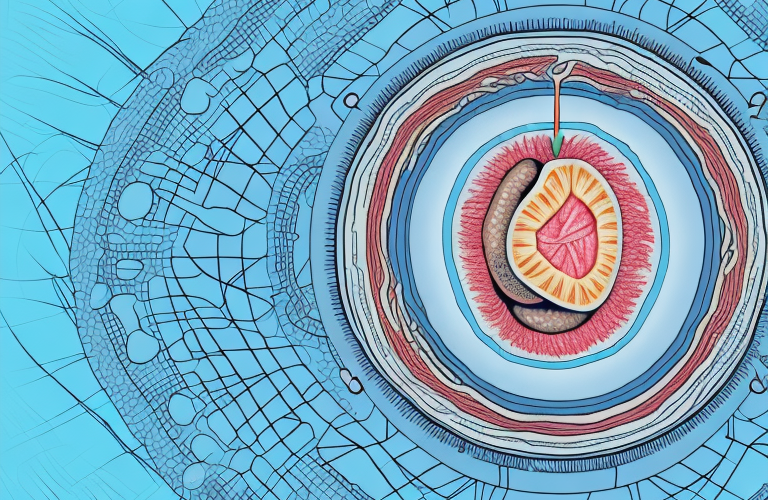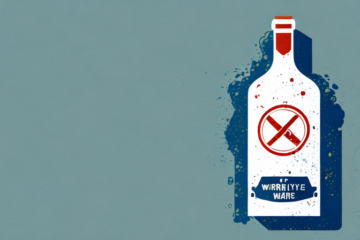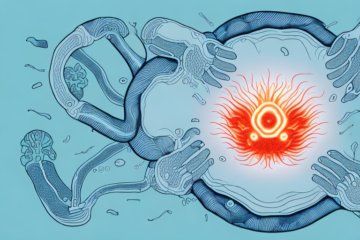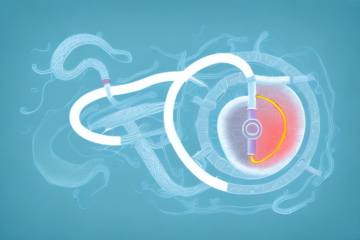Esophageal cancer is a relatively rare but serious type of cancer that affects the esophagus. The esophagus is a muscular tube that connects the throat to the stomach, and helps to transport food and fluids from the mouth down to the stomach. Esophageal cancer develops when abnormal cells in the lining of the esophagus grow uncontrollably and form a tumor. This tumor can interfere with the normal functioning of the esophagus and can even spread to other parts of the body if left untreated.
What is Esophageal Cancer?
There are two main types of esophageal cancer: squamous cell carcinoma and adenocarcinoma. Squamous cell carcinoma is more common in developing countries and is caused by the repeated exposure of the esophagus to irritants such as tobacco, alcohol, and hot liquids. Adenocarcinoma, on the other hand, is more common in developed countries and is often linked to chronic gastroesophageal reflux disease (GERD). Other risk factors for esophageal cancer include obesity, poor nutrition, and a family history of the disease.
Esophageal cancer is a serious and often deadly disease. Symptoms may include difficulty swallowing, chest pain, weight loss, and hoarseness. Unfortunately, many people do not experience symptoms until the cancer has already spread to other parts of the body.
Early detection is key to successful treatment of esophageal cancer. Screening tests such as endoscopy and biopsy can help detect the disease in its early stages. Treatment options may include surgery, radiation therapy, chemotherapy, or a combination of these approaches.
Causes of Esophageal Cancer
The exact causes of esophageal cancer are not fully understood, but certain factors can increase your risk of developing the disease. These include:
- Smoking: Tobacco smoke contains chemicals that can damage the cells in the lining of the esophagus and increase the risk of cancer.
- Alcohol: Heavy drinking can irritate the esophagus and also increase the risk of cancer.
- GERD: Chronic acid reflux can cause inflammation and changes in the cells in the lining of the esophagus, which can increase the risk of cancer.
- Obesity: Being overweight can increase the risk of developing esophageal cancer, especially if the excess weight is located in the abdominal area.
- Poor nutrition: A diet that is low in fruits and vegetables can increase the risk of esophageal cancer.
- Family history: Having a close relative who has had esophageal cancer increases your risk of developing the disease.
Esophageal cancer is a relatively rare form of cancer, accounting for only 1% of all cancers diagnosed in the United States. However, it is a particularly deadly form of cancer, with a five-year survival rate of only 20%. Symptoms of esophageal cancer can include difficulty swallowing, chest pain, and unintended weight loss. If you experience any of these symptoms, it is important to speak with your doctor as soon as possible.
Symptoms and Signs of Esophageal Cancer
Esophageal cancer may not cause any symptoms in its early stages, but as the tumor grows and the disease progresses, symptoms may become more noticeable. Common symptoms of esophageal cancer include:
- Dysphagia: Trouble swallowing food or liquids, or feeling like food or liquids are getting stuck in the esophagus.
- Chest pain: Pain or discomfort in the chest, especially when eating or drinking.
- Weight loss: Losing weight without trying, or feeling full quickly when eating.
- Heartburn: Chronic heartburn or acid reflux that does not go away with treatment.
- Coughing: A persistent cough or hoarseness that does not go away.
It is important to note that some people with esophageal cancer may experience symptoms that are not listed above. These can include fatigue, indigestion, and vomiting. Additionally, some people may not experience any symptoms at all until the cancer has advanced to a later stage. Therefore, it is important to speak with a healthcare provider if you have any concerns or notice any changes in your health.
Types of Esophageal Cancer
There are two main types of esophageal cancer: squamous cell carcinoma and adenocarcinoma. Squamous cell carcinoma affects the cells that line the upper part of the esophagus, while adenocarcinoma usually develops in the lower part of the esophagus where it joins the stomach. Other less common types of esophageal cancer include small cell carcinoma, leiomyosarcoma, and gastrointestinal stromal tumor (GIST).
Squamous cell carcinoma is often linked to smoking and heavy alcohol consumption, while adenocarcinoma is associated with gastroesophageal reflux disease (GERD) and obesity. It is important to note that both types of esophageal cancer can occur in anyone, regardless of their lifestyle or medical history.
Esophageal cancer is often diagnosed at a later stage, when it has already spread to other parts of the body. Symptoms may include difficulty swallowing, chest pain, weight loss, and hoarseness. Treatment options may include surgery, chemotherapy, radiation therapy, or a combination of these approaches.
Diagnosis of Esophageal Cancer
If you have symptoms of esophageal cancer, your doctor may order several tests to diagnose the disease. These tests may include:
- Endoscopy: A procedure that uses a flexible tube with a camera to examine the inside of the esophagus and take a biopsy (tissue sample).
- X-rays or CT scans: Imaging tests that can show the extent of the tumor and whether it has spread to other parts of the body.
- Barium swallow: A test in which you drink a special liquid that coats the esophagus and makes it easier to see abnormalities on an X-ray.
In addition to these tests, your doctor may also order blood tests to check for certain markers that can indicate the presence of esophageal cancer. Additionally, if a diagnosis is confirmed, further tests may be ordered to determine the stage of the cancer and the best course of treatment.
Stages of Esophageal Cancer
Once esophageal cancer is diagnosed, it is staged based on the size and location of the tumor, as well as whether it has spread to nearby lymph nodes or other parts of the body. The stages of esophageal cancer include:
- Stage 0: The cancer is only in the innermost layer of the esophageal lining and has not spread.
- Stage I: The cancer has grown beyond the innermost layer of the esophagus but has not spread to nearby lymph nodes or other parts of the body.
- Stage II: The cancer has grown into the muscle layer of the esophagus or has spread to nearby lymph nodes.
- Stage III: The cancer has spread to nearby organs or lymph nodes.
- Stage IV: The cancer has spread to distant parts of the body.
It is important to note that the symptoms of esophageal cancer may not appear until the cancer has reached an advanced stage. These symptoms may include difficulty swallowing, chest pain, weight loss, and hoarseness. If you experience any of these symptoms, it is important to speak with your doctor as soon as possible to determine the cause and receive appropriate treatment.
Treatment Options for Esophageal Cancer
The best treatment for esophageal cancer depends on several factors, including the location and stage of the tumor, as well as your overall health. Common treatment options for esophageal cancer include:
- Surgery: Surgery to remove the tumor is often the primary treatment for esophageal cancer, especially in its early stages.
- Radiation therapy: High-energy radiation can be used to kill cancer cells or shrink the size of the tumor.
- Chemotherapy: Powerful drugs can be used to kill cancer cells or slow down their growth.
- Targeted therapy: Drugs that target specific molecules in cancer cells can be used to help stop their growth.
- Immunotherapy: Drugs that stimulate the immune system to fight cancer can be used to help treat esophageal cancer.
- Palliative care: Palliative care is designed to improve quality of life for patients with advanced or incurable cancer.
It is important to note that treatment for esophageal cancer often involves a combination of these options. For example, surgery may be followed by radiation therapy or chemotherapy to help ensure that all cancer cells are eliminated. Additionally, clinical trials may be available for patients who have exhausted standard treatment options. These trials can offer access to new and innovative treatments that may be more effective than traditional therapies.
Coping with the Diagnosis of Esophageal Cancer
A diagnosis of esophageal cancer can be overwhelming and difficult to accept. It’s important to remember that you are not alone and that there are many resources available to help you cope with the disease. Some ways to cope with the diagnosis of esophageal cancer include:
- Seeking support from family and friends.
- Joining a support group for people with esophageal cancer.
- Talking to a mental health professional about your feelings and concerns.
- Making lifestyle changes to improve your overall health.
Another way to cope with the diagnosis of esophageal cancer is to educate yourself about the disease. Learning about the causes, symptoms, and treatment options can help you feel more in control and better prepared to make decisions about your care. You can also ask your healthcare provider for information and resources to help you understand the disease.
It’s also important to take care of your emotional and mental health during this time. This may include practicing relaxation techniques, such as deep breathing or meditation, or engaging in activities that bring you joy and relaxation. You may also find it helpful to keep a journal to express your thoughts and feelings about your diagnosis and treatment.
Prognosis and Survival Rates for Esophageal Cancer
The prognosis for esophageal cancer depends on several factors, including the stage of the tumor, the patient’s age and overall health, and how well the cancer responds to treatment. The five-year survival rate for all stages of esophageal cancer is around 20%, but this varies depending on the stage of the cancer at diagnosis.
Esophageal cancer is a type of cancer that affects the esophagus, which is the tube that connects the throat to the stomach. It is more common in men than women and is often diagnosed in people over the age of 50.
There are several treatment options for esophageal cancer, including surgery, radiation therapy, and chemotherapy. The type of treatment recommended will depend on the stage of the cancer and the patient’s overall health. In some cases, a combination of treatments may be used to achieve the best possible outcome.
Prevention and Lifestyle Changes to Reduce the Risk of Developing Esophageal Cancer
There are several lifestyle changes you can make to help reduce your risk of developing esophageal cancer. These include:
- Quitting smoking.
- Limiting alcohol consumption.
- Eating a healthy diet rich in fruits and vegetables.
- Maintaining a healthy weight.
- Treating GERD if you have it.
In addition to these lifestyle changes, regular exercise can also help reduce your risk of developing esophageal cancer. Studies have shown that physical activity can help lower the risk of several types of cancer, including esophageal cancer. Aim for at least 30 minutes of moderate exercise, such as brisk walking or cycling, on most days of the week.
Resources and Support for Patients with Esophageal Cancer
There are many resources available to help patients with esophageal cancer and their families. Some of these include:
- The Esophageal Cancer Awareness Association.
- The American Cancer Society.
- The National Cancer Institute.
- CancerCare.
In addition to these organizations, patients with esophageal cancer can also benefit from support groups. These groups provide a safe space for patients to share their experiences, ask questions, and receive emotional support from others who are going through similar challenges.
It is also important for patients to have access to reliable information about their condition and treatment options. Many hospitals and cancer centers have patient education programs that offer resources such as brochures, videos, and online materials to help patients better understand their diagnosis and treatment plan.
Conclusion
Esophageal cancer is a serious disease that requires prompt diagnosis and treatment. By knowing the risk factors, symptoms, and treatment options for esophageal cancer, you can make informed decisions about your health and take steps to reduce your risk of developing this disease.
It is important to note that early detection is key in treating esophageal cancer. Regular check-ups with your doctor and screening tests can help detect the disease in its early stages, when it is most treatable. Additionally, making lifestyle changes such as quitting smoking, reducing alcohol consumption, and maintaining a healthy weight can also help reduce your risk of developing esophageal cancer.
Finally, it is important to have a support system in place when dealing with esophageal cancer. This can include family, friends, and healthcare professionals who can provide emotional support and guidance throughout the treatment process. Remember, you are not alone in this journey and there are resources available to help you through it.










